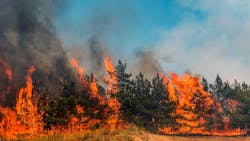Historic Wildfire Bill Passes House of Representatives
The House of Representatives passed Representative Scott Peters’ (CA-50) and Chairman Bruce Westerman’s (AR-4) Fix Our Forests Act, comprehensive bipartisan legislation that will restore forest health, reduce catastrophic wildfires that contribute to pollution and climate change, and increase community resilience to fire threats. A century of fire suppression and decades of mismanagement – combined with rising temperatures – have created a perfect storm of federal forests left susceptible to wildfires, insects, disease, and drought. In California, the nine largest wildfires on record have occurred during the last decade, and in 2020, California wildfires contributed more to climate change than the state’s entire power sector. Catastrophic fire has become the single largest source of particulate pollution in the United States, posing a major threat to communities, watersheds, and ecosystems. The cost of further inaction has become untenable.
There is scientific consensus on the solution: active and science-based forest management, interagency and state-federal-tribal collaboration, and continued R&D on next-generation technologies and solutions. The problem: Forest management projects, like clearing dead trees and dry vegetation that fuel fires, often require multiyear environmental reviews. While we wait for analysis, the forest burns down, adds pollution to the air, contributes to climate change, and threatens communities.
“Wildfires have already burned over 7.3 million acres across the United States in 2024,” said Rep. Peters. “They release over 1.7 billion tons of CO2 every year, cost billions in property damage, and endanger millions through smoke exposure. These numbers cannot speak to the heavy weight borne by those who have lost their homes and loved ones. San Diego knows this pain all too well. Last year, we commemorated the 20th anniversary of the devastating Cedar Fire that killed 17 people, burned more than 3,200 homes and buildings, and caused $17 million of damage. We remember the terror and fear people felt when they had to evacuate. It is with the memory of those victims in mind that I introduced this legislation and fought for its passage in the House. I will continue to work on behalf of my constituents, all Americans, and the environment to change the status quo that treats megafires as the new status quo and not a problem we can tackle.”
“America’s forests are on life support after decades of mismanagement,” said Chair Westerman. “The clock on these ticking time bombs is down to the final few seconds, and Congress must move swiftly to save our forests from imminent destruction. Today, the House took decisive action on the bipartisan Fix Our Forests Act, which will empower local land managers and agencies with tools to enact the most vital forest management projects. The time to fix our forests is now.”
The Fix Our Forests Act is supported by: National Congress of American Indians, Bipartisan Policy Center, Grassroots Wildland Firefighters, Western Fire Chiefs Association, Citizens’ Climate Lobby, American Property Casualty Insurance Association, Association of California Water Agencies, National Rural Electric Cooperative Association, the National Association of Counties, MegaFire Action, the Chamber of Commerce, the Property and Environment Research Center (PERC), American Forests, the Evangelical Environmental Network, Berkshire Hathaway Energy, Sempra, Edison Electric Institute, Pacific Gas & Electric, the Theodore Roosevelt Conservation Partnership, the American Conservation Coalition Action, and the National Wild Turkey Federation.
Background
The Fix Our Forests Act” (FOFA) (HR 8790) will restore forest health, increase resilience to catastrophic wildfires, and protect communities. The bill will:
- simplify and expedite environmental reviews to reduce costs and planning times for critical forest management projects while maintaining rigorous environmental standards;
- reduce the amount of frivolous litigation that delays urgent forest management projects;
- promote federal, state, tribal, and local collaboration by creating a new Fireshed Center and codifying the Shared Stewardship initiative;
- make communities more resilient to wildfire by establishing a Community Wildfire Risk Reduction Program and a Community Wildfire Defense Research Program.
- and; allow federal land managers to use emergency authorities to carry out landscape-scale projects management projects on the most at-risk firesheds.
